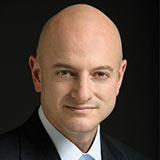Do you know why many traders fail to make more money? asks Dr. Doug Hirschhorn of DrDoug.com.
The answer is oddly enough because they are too worried about giving back money. This overwhelming fear, which I call "profit phobia," is what transforms the talented elite to disappointing underperformers. By the way, for athletes, it is much the same. As soon as an athlete starts to focus on "not losing" rather than "winning," the game is over, many times before it has even started.
How many times have you been up in a trade and started to think about the money? Your head tells you to bank it quick and then play it safe. Don't want to run the risk of giving it back. After all, you made your mark for the day or even week, so your job is over. Bad thinking buddy, as that mentality is not being a trader, that is being an accountant. You have just allowed yourself to shift from a printing press to a savings account. I have worked with elite traders for close to a decade now and I can clearly say that trading is an occupation based on fleeting moments of opportunity. Here one second, gone the next, and totally out of anyone's control. And the best traders love it and even crave it. When the action is there, they are prepared and trained to strike and strike hard, as they have no idea when the next great trade will appear. It's like fishing. You can be out there all day and not get a bite, but then when you hit a school of tuna, you better have your rods ready and baited to maximize this brief window of opportunity. After all, at the end of the day, all that really matters is how many pounds of fish you caught not how long it took to catch them.
Gary is a private client of mine who suffered from a bad case of "profit phobia." He does all the right things as a trader. He sets goals, he takes losses, he makes only high-quality trades, but what he fails to do is to get big when he needs to really hit it. The reasons behind his fear are very reasonable. He has a conservative personality, likes the comfort of stability and consistent income, has a family to support, and a lifestyle to maintain. He consistently makes low-seven figures a year, and by all accounts, Gary should be satisfied as a trader and with his career, but unfortunately, he was not. After years of sitting by and watching less-talented traders make exponentially more money than he did, he finally concluded that he wanted more, not because of greed so much as because he just knew he was capable of doing more and taking his game to the next level.
Enter Dr. Doug.
After working with Gary to isolate not only the issue, but his core motivation for wanting to change, I was able to implement a structured behavior-modification program for him. You see, it wasn't that Gary didn't want to change, it was that he was so afraid of changing and how it would impact his comfort and stability that it prevented him from actually ever changing. The key to this program was to literally force Gary to step outside of his comfort zones. We developed guidelines that he was to follow to force him to increase his position size. If he did not follow his rules, then we agreed to impose severe consequences. The purpose was to get him to be more afraid of the consequences if he failed to move outside of his comfort zone then he was of his profit phobia.
It took a few months, and Gary was able to achieve a 250% increase in his position sizing and become more profitable. The goal of our work together was not to change his personality and eliminate his fear of giving back money. After all, we are who we are, and Gary is Gary. He will always be the conservative, stability-liking and comfort-seeking kind of guy. Instead, our work was designed to give him strategies to make sure he was trading to win, rather than trading not to lose.
By Dr. Doug Hirschhorn
Dr. Doug Hirschhorn can be found at DrDoug.com











